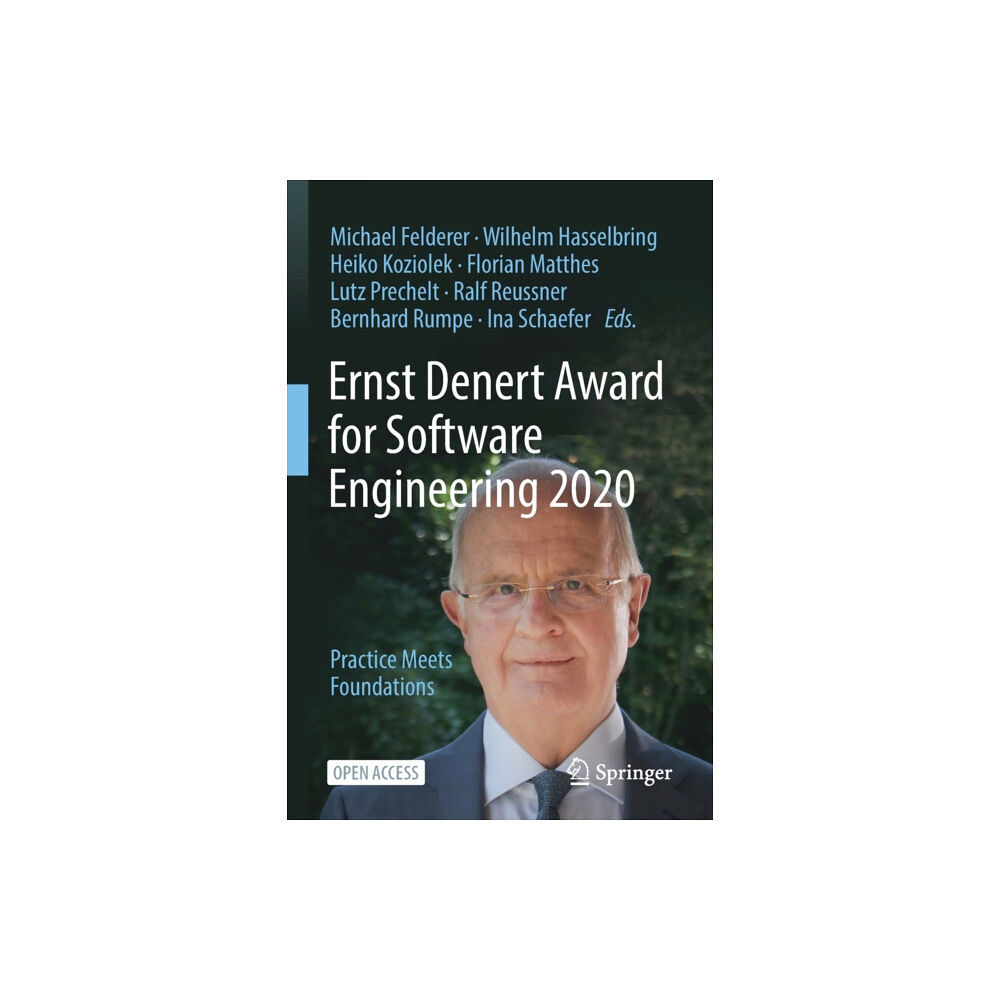- Hem
- Böcker
- Kurslitteratur
- Ekonomi & Företagande
- Ernst Denert Award for Software Engineering 2020 (häftad, eng)

Ernst Denert Award for Software Engineering 2020 (häftad, eng)
This open access book provides an overview of the dissertations of the eleven nominees for the Ernst Denert Award for Software Engineering i...
505 kr
539 kr
Bara 2 kvar
Skickas inom 4 - 5 vardagar
- Fri frakt
Fri frakt över 399:-
Snabb leverans
Alltid låga priser
Produktbeskrivning
This open access book provides an overview of the dissertations of the eleven nominees for the Ernst Denert Award for Software Engineering in 2020. The prize, kindly sponsored by the Gerlind & Ernst Denert Stiftung, is awarded for excellent work within the discipline of Software Engineering, which includes methods, tools and procedures for better and efficient development of high quality software.
An essential requirement for the nominated work is its applicability and usability in industrial practice. The book contains eleven papers that describe the works by Jonathan Brachthäuser (EPFL Lausanne) entitled What You See Is What You Get: Practical Effect Handlers in Capability-Passing Style, Mojdeh Golagha’s (Fortiss, Munich) thesis How to Effectively Reduce Failure Analysis Time?, Nikolay Harutyunyan’s (FAU Erlangen-Nürnberg) work on Open Source Software Governance, Dominic Henze’s (TU Munich) research about Dynamically Scalable Fog Architectures, Anne Hess’s (Fraunhofer IESE, Kaiserslautern) work on Crossing Disciplinary Borders to Improve Requirements Communication, Istvan Koren’s (RWTH Aachen U) thesis DevOpsUse: A Community-Oriented Methodology for Societal Software Engineering, Yannic Noller’s (NU Singapore) work on Hybrid Differential Software Testing, Dominic Steinhofel’s (TU Darmstadt) thesis entitled Ever Change a Running System: Structured Software Reengineering Using Automatically Proven-Correct Transformation Rules, Peter Wägemann’s (FAU Erlangen-Nürnberg) work Static Worst-Case Analyses and Their Validation Techniques for Safety-Critical Systems, Michael von Wenckstern’s (RWTH Aachen U) research on Improving the Model-Based Systems Engineering Process, and Franz Zieris’s (FU Berlin) thesis on Understanding How Pair Programming Actually Works in Industry: Mechanisms, Patterns, and Dynamics – which actually won the award.
The chapters describe key findings of the respective works, show their relevance and applicability to practice and industrial software engineering projects, and provide additional information and findings that have only been discovered afterwards, e.g. when applying the results in industry.
This way, the book is not only interesting to other researchers, but also to industrial software professionals who would like to learn about the application of state-of-the-art methods in their daily work.
An essential requirement for the nominated work is its applicability and usability in industrial practice. The book contains eleven papers that describe the works by Jonathan Brachthäuser (EPFL Lausanne) entitled What You See Is What You Get: Practical Effect Handlers in Capability-Passing Style, Mojdeh Golagha’s (Fortiss, Munich) thesis How to Effectively Reduce Failure Analysis Time?, Nikolay Harutyunyan’s (FAU Erlangen-Nürnberg) work on Open Source Software Governance, Dominic Henze’s (TU Munich) research about Dynamically Scalable Fog Architectures, Anne Hess’s (Fraunhofer IESE, Kaiserslautern) work on Crossing Disciplinary Borders to Improve Requirements Communication, Istvan Koren’s (RWTH Aachen U) thesis DevOpsUse: A Community-Oriented Methodology for Societal Software Engineering, Yannic Noller’s (NU Singapore) work on Hybrid Differential Software Testing, Dominic Steinhofel’s (TU Darmstadt) thesis entitled Ever Change a Running System: Structured Software Reengineering Using Automatically Proven-Correct Transformation Rules, Peter Wägemann’s (FAU Erlangen-Nürnberg) work Static Worst-Case Analyses and Their Validation Techniques for Safety-Critical Systems, Michael von Wenckstern’s (RWTH Aachen U) research on Improving the Model-Based Systems Engineering Process, and Franz Zieris’s (FU Berlin) thesis on Understanding How Pair Programming Actually Works in Industry: Mechanisms, Patterns, and Dynamics – which actually won the award.
The chapters describe key findings of the respective works, show their relevance and applicability to practice and industrial software engineering projects, and provide additional information and findings that have only been discovered afterwards, e.g. when applying the results in industry.
This way, the book is not only interesting to other researchers, but also to industrial software professionals who would like to learn about the application of state-of-the-art methods in their daily work.
| Format | Häftad |
| Omfång | 293 sidor |
| Språk | Engelska |
| Förlag | Springer Nature Switzerland AG |
| Utgivningsdatum | 2022-03-01 |
| ISBN | 9783030831301 |
Specifikation
Böcker
- Format Häftad
- Antal sidor 293
- Språk Engelska
- Utgivningsdatum 2022-03-01
- ISBN 9783030831301
- Förlag Springer Nature Switzerland AG
Leverans
Vi erbjuder flera smidiga leveransalternativ beroende på ditt postnummer, såsom Budbee Box, Early Bird, Instabox och DB Schenker. Vid köp över 399 kr är leveransen kostnadsfri, annars tillkommer en fraktavgift från 39 kr. Välj det alternativ som passar dig bäst för en bekväm leverans.
Betalning
Du kan betala tryggt och enkelt via Avarda med flera alternativ: Swish för snabb betalning, kortbetalning med VISA eller MasterCard, faktura med 30 dagars betalningstid, eller konto för flexibel delbetalning.
Specifikation
Böcker
- Format Häftad
- Antal sidor 293
- Språk Engelska
- Utgivningsdatum 2022-03-01
- ISBN 9783030831301
- Förlag Springer Nature Switzerland AG
